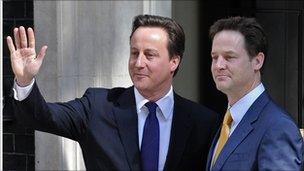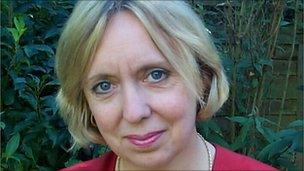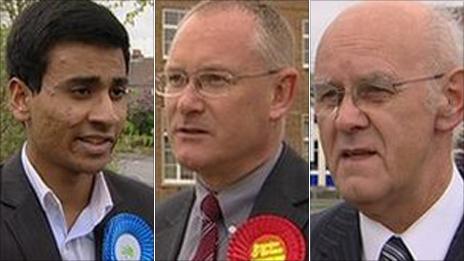The honeymoon is over
- Published
- comments
The honeymoon is over. But will the marriage survive?
Increasingly acrimonious exchanges between Liberal Democrat 'Yes' campaigners and prominent Tories on the 'No' side of the AV Referendum debate have led to speculation about the long term viability of the coalition government itself.
Ladbrokes have been quoting odds of 3-1 on the possibility of a general election this year.

Cameron and Clegg: Will the marriage survive?
There is undoubtedly some genuine anger during these final days of the campaign.
But surely, it's not too fanciful to suggest that there is also an element of what I call "the licensed spat" in an argument which is being deliberately accentuated in order to stir the electorate from their collective slumbers on this issue.
Tying the knot
One thing we can be sure of in a week dominated by wedding bells is that even under the current first-past-the-post system, our political parties seem increasingly to be getting into the way of tying the knot. The question of whether AV would make coalitions more or less likely is one of the most hotly contested issues in the campaign.
The largest local authority in Europe has been run by a coalition for eight years: Birmingham, external's Conservative-Liberal Democrat "progressive partnership" has been widely seen as a microcosm of Westminster's administration.
But Labour go into these elections with just four fewer seats than the Conservatives, so they're hoping to supplant them as the largest party - though with just one third of the seats up for election, the coalition itself looks set to survive, for one more year at least.
There's another Conservative-Liberal Democrat partnership in Newcastle-under-Lyme, external in Staffordshire. Here again, they're voting in thirds so the coalition are confident they'll live to fight again another day.
Losing ground

Lorely Burt MP: Battling to keep Conservatives out in Solihull
But just when you start to see a pattern beginning to emerge among these unholy alliances, suddenly you find you have to think again.
Take Solihull, external for example. It's currently ruled by an "agreement" between the Liberal Democrats and Labour.
Together they can currently muster just one more vote than the largest single party, the Conservatives.
So the town's Liberal Democrat MP Lorely Burt, external, having fought tooth and nail a year ago to defeat the Conservatives in the general election, now finds herself sitting alongside them at Westminster but battling furiously again to keep them out in Solihull.
If direst predictions about declining Liberal Democrat support were to come true here, the council could return to Conservative control, even though they were themselves losing ground as well.
Politics is full of ironies.
Marriages made in heaven?
BBC West Midlands politics reporter Susana Mendonca has been touring to assess the strengths and weaknesses of these marriages made, if not in heaven, then at least in the Town Hall or the Council House.
She will explaining what she found there on this Sunday's Politics Show, where she will also be talking to the rising generation of voters in one of the many students' bars at the University of Birmingham.
What do they make of the AV referendum? Would a 'Yes' vote unleash a chorus of anger on the Conservative back benches against the Prime Minister himself? Conversely, would a 'No' vote lead to a possible Liberal Democrat leadership challenge to Nick Clegg?
These are some of the talking points I'll be taking up in the studio with our guests the Conservative MP for West Worcestershire, Harriett Baldwin, external; the Labour MP for Wolverhampton South East Pat McFadden, external; and the Liberal Democrat MP for Birmingham Yardley John Hemming, external.
And I hope you will be able to join us too.
That is the Politics Show from 1200 BST on BBC One on Sunday 1 May.
- Published17 April 2011
